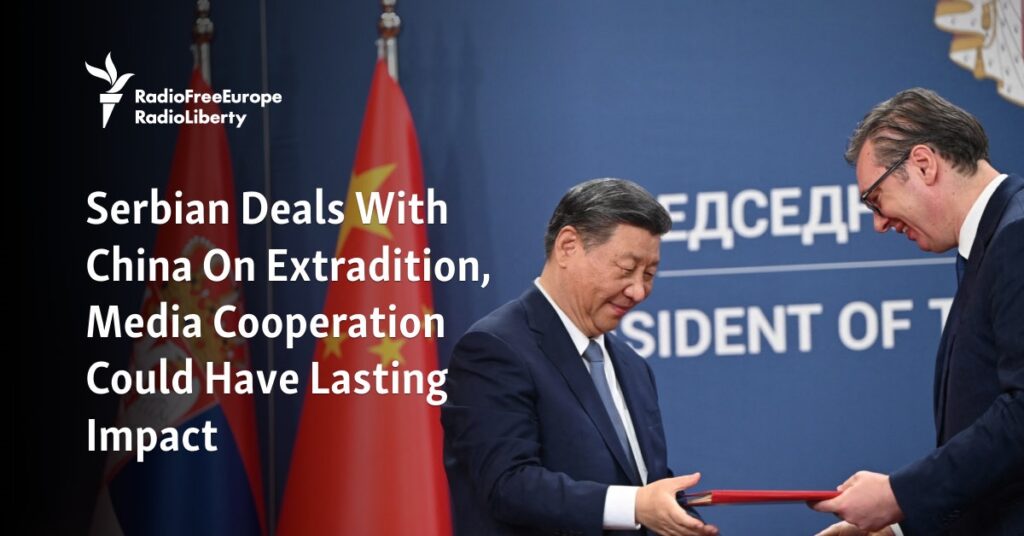Chinese leader Xi Jinping looks on as Serbian President Aleksandar Vucic speaks from the Palace of Serbia during a two-day state visit to Belgrade on May 8.
The agreements signed on May 8 in Belgrade set up cooperation deals with China Media Group and three pro-government Serbian media companies, the public broadcaster Radio Television of Serbia, the daily newspaper Politika, and the Tanjug news agency.
Tamara Skrozza, a journalist and member of the Press Council, an independent regulatory body that monitors journalism ethics in the Serbian media, says the deals with the Serbian media entities highlights the lack of transparency surrounding the proposed collaboration.
“We’re uncertain about its scope, as well as what limitations these media outlets may face due to such agreements, whether they influence their editorial stance or if it’s merely a straightforward exchange of content,” she told RFE/RL’s Balkan Service.
Skrozza also emphasized that existing pro-Chinese narratives in Serbia are set to become “even more pronounced after the signing of agreements and memoranda” when combined with the country’s declining press freedom situation.
The media watchdog Reporters Without Borders has placed Serbia 98th out of 180 countries in its World Press Freedom Index for 2024, marking the Balkan country’s lowest standing since the creation of the ranking in 2002.
Tanjug and Politika did not respond to RFE/RL’s requests for comment, but Radio Television Serbia said they have been engaged in various types of partnerships with Chinese media companies since 2013. The company’s channels have also consistently featured a dedicated slot for airing Chinese documentaries since 2017.
“So far we have aired more than 200 Chinese documentaries covering various aspects such as [China’s] history, customs, cuisine, culture, specific crafts, landmarks, and everyday life,” a spokesperson told RFE/RL’s Balkan Service.
The spokesperson added that the new deal was centered upon ways to “facilitate the exchange of content and foster co-productions,” and that the company has similar arrangements with broadcasters from Bulgaria, Turkey, Azerbaijan, and Hungary.
Skrozza says exchanging content on cultural topics isn’t problematic, but that the agreement is worrisome because it could lead to a censored and distorted view of life and politics inside China and Beijing’s policies around the globe.
“The problem isn’t what they will feature in their programming, but what they won’t,” she said. “If we only show images of Chinese folklore and nature, we’re not actually informing the citizens of Serbia about the real situation.”
Written by Reid Standish in Prague with reporting by Dusan Komarcevic, Jovana Krstic, and Nevena Bogdanovic of RFE/RL’s Balkan Service in Belgrade
Source link : https://www.rferl.org/a/xi-vucic-china-serbia-media-extradition/32962554.html
Author :
Publish date : 2024-05-25 07:00:00
Copyright for syndicated content belongs to the linked Source.
